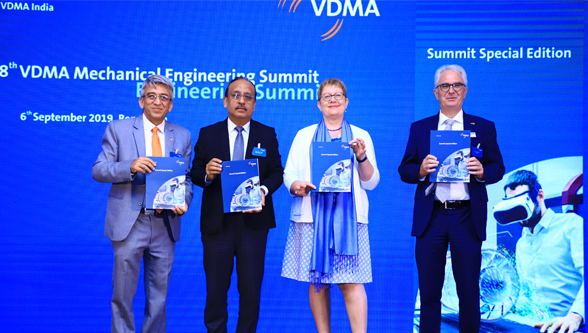The 8th VDMA Mechanical Engineering Summit was held at Hotel Sheraton in Bangalore on September 6, 2019. The summit was attended by around 250 people. Rajesh Nath, Managing Director, VDMA India, welcomed the attendees at the outset of the event.
Speaking about the current year, Nath said, “It has been an eventful year so far. Starting Narendra Modi getting re-elected with a thumping majority leading to the beginning of Modi 2.0 to the escalating trade war between the U.S. and China rippling through the global economy.”
Nath went on to add that the uncertainty of Brexit followed by the slump in the automotive sector in India in the first two quarters of 2019 have already raised a lot of pertinent questions including where the Indian economy is heading to. But this is the ideal time to consolidate and have an optimistic view. The monsoon revival followed by a lot of positive steps taken by the Indian government of India to boost investment and growth will eventually help the country come out of the current situation.
This was followed by a special address by the guest of honour, Vinay Kumar Katyal, Director, Bangalore Complex, Bharat Electronics Ltd. In his speech, Katyal mentioned that there was a wrong perception that most public sector undertakings in India were not performing well and incurring losses. Contrary to this perception, Bharat Electronics Ltd had a turnover of Rs 11,000 crore in 2018.
Ulrich Ackermann, Managing Director of Foreign Trade Division, VDMA Frankfurt then gave a presentation on the challenges of global trade. Global trade and investment or globalization, is a common market condition for all countries of the world now. However, it is not free from challenges.
The technical session I commenced with a presentation on Macroeconomics Trade and Digitisation by Suvir Davda, Global Market Corporate Sales, HSBC, India. Davda mentioned that there is a need to watch out for US-China trade tension, RMB move, domestic slowing down of the economy and resultant impact on capital flows. On the positives, lower oil prices and a possible movement of global supply chains to India could give a push to exports.
The last presentation was by Debabrata Sinha, Chief Financial Officer, V.P, Rittal India. He shared his experience on anti-profiteering in the engineering industry and mentioned that the anti-profiteering framework under the goods and services tax (GST) has been extended by another two years.
The post-lunch technical session began with the release of the report “Industry 4.0 and its impact on the people practices- within the HR domain” prepared by the HR Strategy Partner Maier+Vidorno.
The report tried to elucidate the key strategies and road maps required by HR to successfully restructure the various departments within the company and to pursue the establishment of end to end Industry 4.0 technologies.
The theme of technical Session II was Industrial Automation to Industrial Autonomy. It began with the presentation on the Future on Automation by M R Subramanya, Vice President, Siemens Technology and Services Private Limited. As per Subramanya, for an Automation system to become self-learning, the existing data-based decision making must evolve into a more flexible inference-based system, where the human interaction is confined to a bare minimum.
The final session of the summit was devoted to “India Marching towards a 5 Trillion Dollar Economy – Role of Manufacturing”. This Panel discussion was moderated by Rajesh Nath, Managing Director, VDMA India. The discussions began with Nath, asking each of the panel members to explain the readiness of Indian SMEs in adopting Industry 4.0, followed by the impact of GST in reforming the business game and the importance of Re-Skilling as well as the Industry-Academia interaction.
After the panel discussion, the stage was set for the 2nd VDMA Manufacturing Excellence Awards aimed at recognising the VDMA members who have implemented methods either in energy efficiency and conservation or improvement in work conditions and work safety in their manufacturing process.



